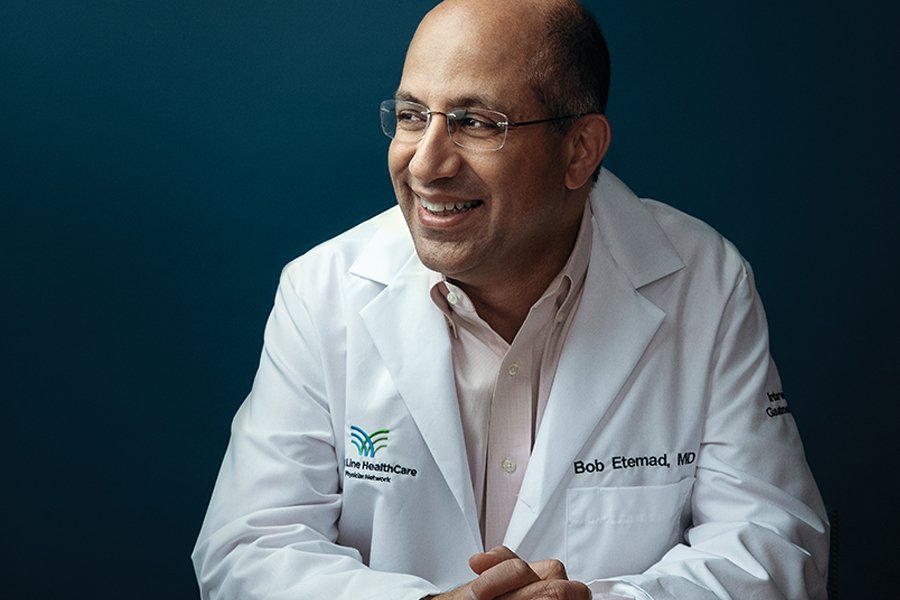Meet the MD Transforming GI Care on the Main Line

Photo credit: Justin James Muir
Did you know that what you eat affects much more than your weight and gut health? The old adage, “you are what you eat” is true! In fact, your food choices can impact the well-being of your entire body, including your heart and immune system. You’re probably thinking twice about that bacon cheeseburger you had for lunch right about now. But rest assured, although it’s important for you to weigh in on your own healthy eating habits, GI care has never been better, especially in the Philadelphia area.
You can thank individuals like Bob Etemad, MD, medical director of GI endoscopy services for Main Line Health and medical director of the endoscopy unit at Lankenau Medical Center, for providing some of the most innovative treatment options available to the Delaware Valley. Well-known across the region as a specialist for endoscopic approaches to pancreatic and bile duct disease, GI cancers, Barrett’s esophagus and other complex GI-related diseases, Dr. Etemad has seen first-hand the strides in technology happening in the GI field. From tiny microscopes to high-tech robotics, testing, diagnostics and treatments have never been better or less invasive.
We sat down with Dr. Bob Etemad to discuss everything from small eating tips to the latest and greatest tech that might just save your life. With more than 9,000 endoscopic ultrasounds and 7,000 ERCPs (endoscopic retrograde cholangio-pancreatography), a procedure that examines the pancreatic and bile ducts, under his belt, it’s safe to say, he’s a trusted source for everything GI. Here’s what he had to say.
Why is it important to pay attention to your GI health?
GI health is a field where you, the patient, can make a significant impact on your health. You can choose either to abuse yourself or take care of yourself. Your heart health is predetermined in some ways but very much affected by your GI health. Your endocrinology health is somewhat predetermined but very much influenced by your GI health. Your weight, happiness, so many aspects of our lives have to do with what we eat and how we eat it.
What are some common misconceptions about gut health?
We’re realizing that, over time, science changes our opinions of what’s healthy and what’s not. For example, we’re finding that fats might not be as terrible as we initially thought, but sugars might be worse for us. It’s a good thing we’re focusing on diet and food and gaining new knowledge almost daily. I think we’ll find that many disorders can be managed, improved or potentially prevented by how we eat. Not just celiac disease, obesity and diabetes but also autoimmune disorders and arthritis. Our immunity is very affected by what we eat.
What excites you about the gastroenterology field right now? Technology affects so much of medicine, and GI is a great example of that. In the last 30 years, we’ve miniaturized much of the equipment we use, allowing us access to places we had previously been unable to get to using the natural orifices of the body. These newer technologies allow us to solve problems that previously required open surgery without even leaving a scar or making holes. Increasingly, surgeons come to us and say, “Look, I could do it this way, but if you can do it in a less invasive way, let’s try that.” That has a profound impact on people’s lives—they’re able to leave the same day as the procedure and experience less pain.
Why did you choose to practice in the area? The Main Line is my home. It is where I grew up, and where I still live today. The ability to be back in the community where I was raised and to literally take care of my community— my previous teachers, friends and my family’s friends—is very rewarding. On top of that, the most advanced technology and tools are available to me here. We have the capacity to take care of very sick patients, and to do that in their home hospital.
What should patients look for in a GI doctor?
GI involves risky procedures, so experience is really valuable. I, along with our nurses and other team members, have participated in thousands of these procedures. This offers patients one of the most experienced endoscopy teams in the Delaware Valley. This proficiency helps us identify those things that are abnormal as well as things that are part of the spectrum of normal, so that we don’t do excessive testing.
How can people keep their GI system healthy?
Our gut flora and our immune systems are very impacted by what we eat, and in turn have a great impact on our overall health.
What do you wish people knew about their GI system?
Going to sleep a bit hungry is not a bad thing! Feeling full is an important feeling for many people but it’s not necessary and, in fact, it’s good to feel a little hungry. Develop a dietary pattern that’s healthy and works for you and stick to it.
For more information on Lankenau’s world-class GI care and elegant recovery suites, click here.
This is a paid partnership between Main Line Health- Lankenau Medical Center and Philadelphia Magazine

